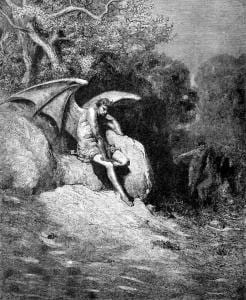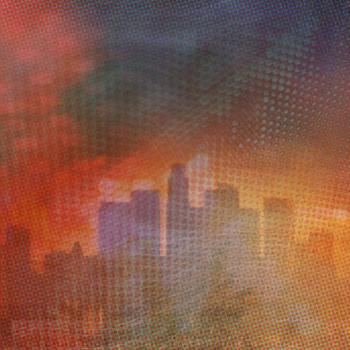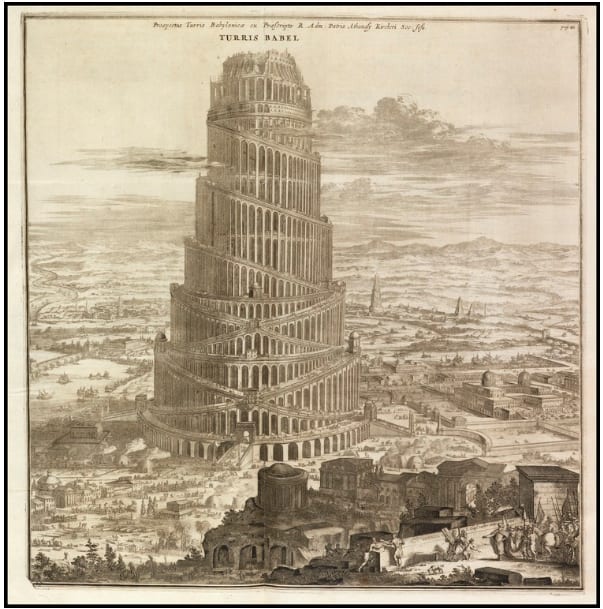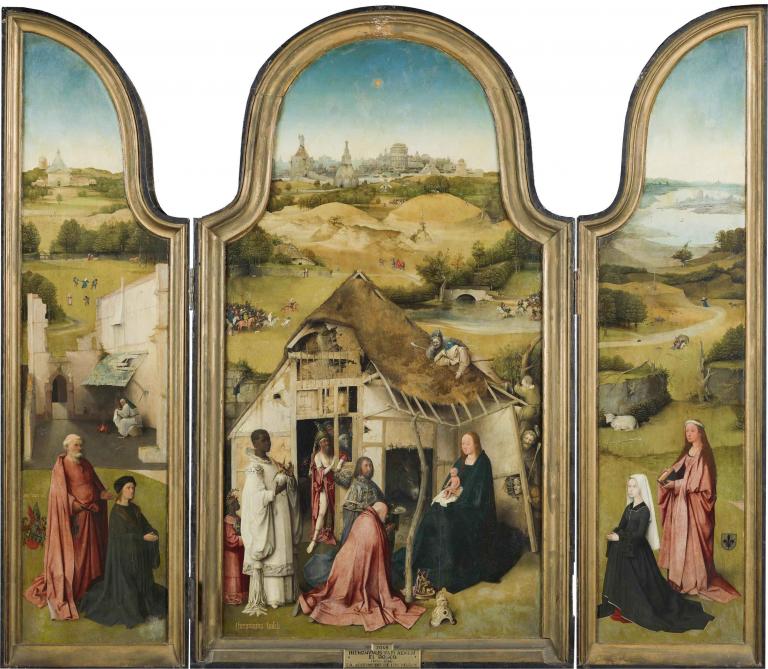Spoiler Alerts about the End
In Neal Stephenson’s latest novel Fall; Or, Dodge in Hell (William Morrow, 2019), the notion of “the fall” seems to apply to a number of things. It begins with the unexpected death of a video game-designing billionaire, Richard “Dodge” Forthrast. Dodge’s will turns out to contain some old extropian boilerplate text, which means that his family, friends, and fortune become focused on extending his life through technology. The death of Dodge is followed by the decline of other things: the internet, Enlightenment reason, America, embodied existence, and the digital paradise developed for (and then by) Dodge.
In the midst of this expansive and stimulating “philosophical action novel,” as the physical world of “Meatspace” is falling apart and the virtual world of “Bitworld” is being built, Stephenson’s enigmatic character Enoch Root shows up. Enoch, whose names link him with the first city, immortality, and privileged access to the system of the world, has a history of significantly enriching the dialogue and advancing the plot in Stephenson’s stories. Enoch’s focal questions and actions in this book concern new eschatologies.
In one exchange, about whether or not brains and consciousness can be simulated, Enoch shares his “suspicion that there are aspects of who we are that will not come back when our brains are scanned and simulated”:
It’s not clear to me that memory will work, for example, when its physical referents are gone. It’s not clear that the brain will know what to do with itself in the absence of a body. Particularly, a body with sensory organs feeding it a coherent picture of the world. (244f.).
Enoch also shares his interest in theology, which “can do duty as a cracked mirror or a smudged lens through which we might be able to glimpse things that are informative” (244). And information, Enoch argues, is the basis of reality: it brings coherence to a world and the identities and relationships embedded in it.

Existence in Bitworld followers patterns of the world that generates it—its creation, fall, and the battle over its future. Dodge has an antagonist in a digitized tech billionaire called El (Hebrew for god), who isn’t at all happy with the simulation of the familiar constraints of physical bodies, landforms, and laws. El does have a point: “amortality”—or death after death—in Bitworld isn’t an entirely inspiring vision of human transformation.
Bitworld of course, which is roughly shaped like a brain, owes its creation and continuing existence to Meatspace—including substantial hardware that extends into space. Its redemption, too, comes from outside. Inhabitants speculate about a preexisting plane of existence, out of which their Land was born, and how that other world could influence theirs. One of the more informed Bitworlders argues that an outside agent would need “to do so without violating what makes the Land coherent” (844). Coherence further requires that everything must ultimately make sense, no matter how bad how things get, and that effects have to wait for causes to arrive.
At the end of the book and narrative of Bitworld, we see “curious souls who were skilled at plumbing the deep nature of things [striving] to divine the hidden secrets of the other plain of exitance and to fashion ever tinier and more sophisticated machines” (881)—a familiar philosophical and technological trajectory.
First, perhaps, by neurological instinct, and then intentionally by consumer demand, Bitworld becomes a teleological representation of the life and world already known.
A New End for the Library
Dodge’s niece Sophia, a principal architect of and agent within Bitworld, at an early point in the narrative raises the ethical problem of shutting down the processes they’ve initiated: “To destroy it would at best be akin to burning a library. At worst it might be murder” (320).
Bitworld has its own libraries: it’s one of the Land’s earliest institutions, and it enables Dodge to read his story and recover his identity. And, in a sense, the digitally copied or represented lives that inhabit it are perhaps best understood as living books in a library.
Elsewhere I’ve worked through definitions of the library and information and introduced the idea that information is a fundamental component of life and reality. The ontological nature of information—the process of selecting and transmitting meaningful data—is debated by scientists, theologians, and others. But the word is used commonly to describe biological, technical, communication, and other processes.
Before the library, information existed in the wild—within nature, in living minds and actions, and in traces in stone artifacts and walls. Our origins as a species is connected with the ability to abstract and imagine information, and this information revolution was followed by the creation of information agencies and artifacts. The institution of the library was created to provide immediate and long-term access to these artifacts: tablets, scrolls, codices, and other forms of information communication technologies. Through the selection and transmission of these technological artifacts, the library itself became a complex information technology for sustaining the human information process. It became and remains a critical infrastructure for shaping individual and collective attention and agency.
After the invention of the library, the library became the best metaphor and mechanism for imagining a better world.
Alberto Manguel opens his book The Library at Night (Yale, 2006) with the following claim:
Outside theology and fantastic literature, few can doubt that the main features of our universe are its dearth of meaning and lack of discernible purpose. And yet, with bewildering optimism, we continue to assemble whatever scraps of information we can gather in scrolls and books and computer chips, on shelf after library shelf, whether material, virtual or otherwise, pathetically intent on lending the world a semblance of sense and order, while knowing perfectly well that, however much we’d like to believe the contrary, our pursuits are doomed to failure (3).
For Mangeul, the library represents one of humanity’s greatest attempts to shape and justify the future. The Library and Night begins with musings on the library as myth and order, and ends with discussions of the library as identity and home. Like theology and imaginative literature, the library is shaped by an alternative vision of the world. When theology concerns faith for the future and literature speculates about the future, we are thinking eschatologically. The library itself functions as an eschatological infrastructure: its selection, collection, and mediation of knowledge is oriented to future as well as present realities.
In the end, Mangeul claims that the ambition of the library dissolves in futility. The ambitious project of the Library of Alexandria, to collect “all the books in the world,” is as ill-fated as the Tower of Babel:
We can admire the mythical Tower rising visibly to prove that the impossible is worth attempting, no matter how devastating the result; we can see it working its way upwards, the fruit of a unanimous, all-invading, antlike society; we can witness its end in the dispersion of its individuals, each in the isolation of his own linguistic circle. We can roam the bloated stacks of the Library of Alexandria, where all imagination and knowledge are assembled; we can recognize in its destruction the warning that all we gather will be lost, but also that much of it can be collected again; we can learn from its splendid ambition that what was one man’s experience can become, though the alchemy of words, the experience of all, and how that experience, distilled once again into words, can serve each singular reader for some secret, singular purpose (33).
While Mangeul says he doesn’t expect a revelation from his library, he doesn’t seem convinced by his assertions of futility. In his own library, and in the libraries of nations, he sees hope for the revelation and animation of identity. His private library is a reflection and extension of his identity as public libraries are reflections and extensions of their communities’ identities. In both personal and institutional libraries, information is “transformed again into experience, in the words reflected both in the outside world and in the reader’s own being” (91). Further, Mangeul holds up the library as “a negotiable image of that real world” (323) and a place “for future readers to find clues in order to imagine better worlds” (Packing My Library [Yale, 2018], 143). Libraries are not just eschatological—they are apocalyptic.
In Stephenson’s apocalyptic novel Seveneves, digital and physical libraries are critical for the survival of humanity. In the apocalypse of Fall, human experience is reduced to digital data and becomes information in a new sort of library. This library is both an extension of those who created it and a resource for those who engage with it in the future.
If we were able to create a digital world for ourselves, its ontology would be like that of a digital library: a collection of digital patterns or processes that, as John Milton said of books, “have a potency of life in them”:
Books are not absolutely dead things, but do contain a potency of life in them to be as active as that soul was whose progeny they are; nay they do preserve as in a vial the purest efficacy and extraction of that living intellect that bred them.
The library’s role within our current information revolution is still evolving. But, as our lives and world are increasingly filled with intelligent and autonomous information-processing systems, one can see how the library conceptually, practically, and productively enhances our information artifacts, agency, imagination, and coherence.
If, through the “cracked mirror” of theology, we can see the transformation of Babel in New Jerusalem, perhaps through a new vision of the end of the library we may transform the Babelesque or antilibrary elements of our information age into a New Alexandria.
A Digression on the Simulation Argument
It’s tempting to look for a divine agent through Fall’s “smudged lens.” But Stephenson has said he’s specifically interested in the question, “could it be the case that the world we live in is a digital simulation”?:
What happens in the book is that a new digital simulation is created as a sort of digital afterlife for people to live in, and it raises the question of, is it turtles all the way down? Are we living in a digital simulation and creating our own digital simulations inside of it? And if so, how deep does that stack go?
Nick Bostrom’s Simulation Argument contends:
at least one of the following propositions is true: (1) the human species is very likely to go extinct before reaching a “posthuman” stage; (2) any posthuman civilization is extremely unlikely to run a significant number of simulations of their evolutionary history (or variations thereof); (3) we are almost certainly living in a computer simulation.
Micah Redding, Executive Director of the Christian Transhumanist Association, interprets the Simulation Argument as a useful “argument for the existence of a Creator”: “The argument tells us that either the ultimate reach of intelligent life is quite constrained, or that we are already likely to be living in a world constructed by intelligent life.” Acknowledging objections about describing the created world as a simulation, Redding points out that “traditional theism claims that the universe is a product of intelligence, that it exhibits design, is built on rules, and so on. This is indistinguishable from an abstract description of a computer simulation.”
Handled analogically, the Simulation Argument may be helpful in providing an opportunity for theological engagement with texts such as Fall, arguments “from the deep future,” and ideas about new eschatologies. But as Redding acknowledges, this is only the “starting point”: “we do not assert proof of God’s existence—we assert that we have an ethical duty to hope and trust in God’s existence … we have to have faith and hope in the future.”












